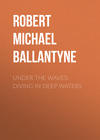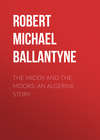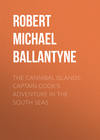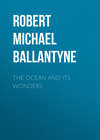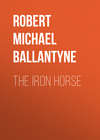Loe raamatut: «Under the Waves: Diving in Deep Waters», lehekülg 15
Chapter Twenty One.
Difficulties of various Kinds, also Troubles, and a Discovery
“Gentlemen,” said the captain of the gun-boat to Mr Hazlit and Edgar as they sat that morning at breakfast, “it is my intention to run to the nearest town on the coast—which happens to be Muku—have these pirates tried and shot, then proceed to Singapore, and perhaps run thence to the coast of China. I will take you with me if you wish it, or if you prefer it, will put you on board the first homeward-bound passenger-ship that we can find. What say you?”
Now, reader, we possess the happy privilege of knowing what Mr Hazlit and Edgar thought as well as what they said, and will use that privilege for purposes of our own.
In the first place, Edgar thought he should very much like to hear Mr Hazlit’s views on that subject before speaking. He therefore said nothing.
The course being thus left clear to him, the merchant thought as follows:—
“It’s very awkward, excessively awkward and vexatious. Here am I, ever so many thousands of miles away from home, without a single sovereign in my purse, and without even the right to borrow of the captain, for I have nothing certainly available even at home—Some! Why, I have no home!”
At this point the poor man’s thoughts took form in words.
“Ahem!” he said, clearing his throat, “I am much obliged by your kindness (‘Don’t mention it, sir,’ from the captain), and should prefer, if possible, to reach Hong-Kong and ship thence for England. You see, I have some business friends there, and as I shall have to replenish my purse before—”
“Oh, don’t let that stand in the way,” said the captain, promptly, “I shall be happy to lend what you may require, and—”
“Excuse my interrupting you, captain, and thanks for your obliging offer,” said Mr Hazlit, holding up his large hand as if to put the suggestion away; “but for reasons that it is not necessary to explain, I wish to recruit my finances at Hong-Kong.”
“And I,” said Edgar, breaking in here, “wish to go to the same place, not so much on my own account as on that of one of my companions, who has left two very pretty little pieces of property there in the shape of a wife and a child, who might object to being left behind.”
This settled the question, and the breakfast party went on deck.
“Mr Hazlit,” said Edgar, “will you walk with me to the stern of the vessel? I wish to get out of earshot of others.”
Mr Hazlit replied, “Certainly, Mr Berrington;” but he thought a good deal more than he said. Among many other things he thought, “Ah! Here it comes at last. He thinks this a good time to renew his suit, having just rendered us such signal assistance. I think he might have waited! Besides, his saving our lives does not alter the fact that he is still a penniless youth, and I will not give my daughter to such. It is true I am a more thoroughly penniless man than he, for these villains have robbed me and Aileen of our rings, chains, and watches, on which I counted a good deal,—alas! But that does not mend matters. It makes them rather worse. No, it must not be! My child’s interests must be considered even before gratitude. I must be firm.”
Thought is wondrously rapid. Mr Hazlit thought all that and a great deal more during the brief passage from the companion-hatch to the stern-rail.
“I wish to ask you to do me a favour, Mr Hazlit,” the young man began.
The merchant looked at him with a troubled expression.
“Mr Berrington, you have been the means of saving our lives. It would be ungrateful in me to refuse you any favour that I can, with propriety, grant.”
“I am aware,” continued Edgar, “that you have—have—met with losses. That your circumstances are changed—”
Mr Hazlit coloured and drew himself proudly up.
“Be not offended, my dear sir,” continued the youth earnestly; “I do not intrude on private matters—I would not dare to do so. I only speak of what I saw in English newspapers in Hong-Kong just before I left, and therefore refer to what is generally known to all. And while I sincerely deplore what I know, I would not presume to touch on it at all were I not certain that the pirates must have robbed you of all you possess, and that you must of necessity be in want of present funds. I also know that some of a man’s so-called ‘friends’ are apt to fall off and fail him in the time of financial difficulty. Now, the favour I ask is that you will consider me—as indeed I am—one of your true friends, and accept of a loan of two or three hundred pounds—”
“Impossible, sir,—im— it is very kind of you—very, Mr Berrington—but, impossible,” said Mr Hazlit, struggling between kindly feeling and hurt dignity.
“Nay, but,” pleaded Edgar, “I only offer you a loan. Besides, I want to benefit myself,” he added, with a smile. “The fact is, I have made a little money in a diving venture, which I and some others undertook to these seas, and I receive no interest for it just now. If you would accept of a few hundreds—what you require for present necessities—you may have them at three or five per cent. I would ask more, but that, you know, would be usurious!”
Still the fallen merchant remained immovable. He acknowledged Edgar’s pleasantry about interest with a smile, but would by no means accept of a single penny from him in any form.
Edgar had set his heart upon two things that morning, and had prayed, not for success, but, for guidance in regard to them.
In the first he had failed—apparently. Not much depressed, and nothing daunted, he tried the second.
“Captain,” he said, pacing up and down by the side of that black-bearded, black-eyed, and powerful pirate-killer, “what say you to run back to the spot where you sank the pirates, and attempt to fish up some of the treasure with our diving apparatus?”
“I’ve thought of that two or three times,” replied the captain, shaking his head; “but they went down in deep waters,—forty fathoms, at least,—which is far beyond your powers.”
“True,” returned Edgar, “but the prow of the pirate-chief was, you know, run down in only nineteen fathoms, and that is not beyond us.”
“Is it not?”
“No, we have already been deeper than twenty fathoms with the dress I have on board.”
“There is only one objection,” said the captain, pausing in his walk; “I have learned from the prisoners that before we came up with them, Pungarin had had all the money and chief treasure transferred from his own prow to another, which was a faster boat, intending to change into it himself, but that after our appearing he deferred doing so until the fight should be over. If this be true, then the treasure went down in deep water, and the chiefs prow has nothing in it worth diving for.”
“But we are not sure that this story is true; and at all events it is probable that at least some of the treasure may have been left in Pungarin’s boat,” urged Edgar.
“Well, I’ll make the trial; but first I must dispose of my prisoners.”
So saying, the captain resumed his walk and Edgar went below to look after his engine, having, in passing, given Rooney Machowl instructions to overhaul the diving gear and get it into good working order.
This Rooney did with much consequential display, for he dearly loved to bring about that condition of things which is styled “astonishing the natives.” As the Malays on board, seamen and captives, were easily astonished by the novelties of the western hemisphere, he had no difficulty in attracting and chaining their attention to the minutest details of his apparatus. He more than astonished them!
With the able assistance of Baldwin and Maxwell and Ram-stam, he drew out, uncoiled, rubbed, examined inch by inch, and re-coiled the life-line and the air-tube; unscrewed the various pieces—glasses, nuts, and valves—of the helmet, carefully examined them, oiled them, and re-fastened them, much to the interest and curiosity of “the natives.” The helmet itself he polished up till it shone like a great globe of silver, to the intense admiration of “the natives.” The pump he took to pieces elaborately, much to the anxiety of “the natives,” who evidently thought he had wantonly destroyed it, but who soon saw it gradually put together again, much to their satisfaction, and brought into good working order. Rooney even went the length of horrifying one or two of “the natives” by letting one of the heavy shoulder-weights fall on their naked toes. This had the effect of making them jump and howl, while it threw the others into ecstasies of delight, which they expressed by throwing back their heads, shutting their eyes, opening their mouths, and chuckling heartily.
Aileen and Miss Pritty, in the meantime, lay on the sofas in the cabin, and at last obtained much-needed refreshment to their weary spirits by falling into deep, dreamless, and untroubled slumber.
Thus the gun-boat with its varied freight sped on until it reached Sarawak, where the pirates were sent ashore under a strong guard.
With these our tale has now nothing more to do; but as this cutting short of their career is not fiction, it may interest the reader to know that they were afterwards tried by a jury composed half of native chiefs and half of Europeans, who unanimously found them guilty. They were condemned to be shot, and the sentence was carried out immediately, in the jungle, two miles outside of the town. They were buried where they fell, and thus ended one of the sharpest lessons that had ever been taught to a band of miscreants, who had long filled with terror the inhabitants of Borneo and the neighbouring archipelago.
Some idea may be formed of the service done on this occasion—as estimated by those who were well able to judge—when we say that the captain of the gun-boat afterwards received, in recognition of his prowess, a handsome sword and letter of thanks from the Rajah, Sir James Brooke; a certificate, with a pocket chronometer, from the Netherlands-Indian Government; a commander’s commission from the Sarawak Government; and letters of grateful thanks from the Resident Governor of the west coast of Borneo, the Council of Singapore for the Netherlands Government, and others—all expressive of his gallant conduct in utterly routing so large a body of pirates, liberating two hundred and fifty slaves—chiefly of the Dutch settlements—and clearing the Borneon coast of a curse that had infested it for many years. (See Note 1.)
Having disposed of the pirates, the gun-boat proceeded immediately to sea, and in a short time reached the scene of her recent victory. It had previously been proposed to Mr Hazlit that he might remain in Sarawak, if he chose, during the short period of the gun-boat’s intended absence, but the unfortunate man—owing to financial reasons!—decided to remain in the vessel.
It happened to be a calm, lovely morning, not unlike that on which the action had been fought, when they reached the scene of their intended operations, and began to drag for the sunken prow.
The difficulty of finding it was much greater than had been anticipated, for the land, although visible, was much too far off to be of any service as a guide. At last, however, it was discovered; the diving apparatus was got out; the anchor cast, and Maxwell, being esteemed the most enduring among the divers, prepared to go down.
“It feels quite like old times, sir, don’t it?” said Joe Baldwin to Edgar Berrington, as he assisted to dress the diver, and manipulated the various parts of the costume with a fondness that one might feel towards a favourite dog from which one had been for some time parted.
“It does indeed, Joe,” replied Edgar, smiling; “I almost envy Maxwell the pleasure of a dip—especially in such a clear cool sea in this hot weather.”
“How is he to breathe?” asked Miss Pritty, who with Aileen and her father, as well as the captain and crew of the gun-boat, watched the process of robing with as much interest as if they had never before seen it performed.
“Sure, Miss,” observed Rooney Machowl, with great simplicity of aspect, “he does it by drawin’ in an’ puffin’ out the air through his mouth an’ nose.”
“Very true,” observed Miss Pritty, with a good-natured smile, for even she could see that the Irishman was poking fun at her; “but how is air conveyed to him?”
“It is sent down by means of an air-pump,” said Edgar, who took on himself the duty of explaining.
“Dear me!” returned Miss Pritty, elevating her eyebrows in surprise; “I always thought that pumps were used only for pumping up water.”
“Och! No, Miss,” said Rooney, “they’re largely used for pumping up beer in London.”
“Now, David, are you all right?” asked Joe.
“All right,” said Maxwell, as he rose and shook himself to settle the weights comfortably on his back and breast.
“Come along then, me boy,” said Rooney.
Maxwell went to the side of the vessel, where a rope-ladder had been prepared, and his two attendants assisted him to get over.
“All right?” asked Joe again, after giving the order to pump, which Ram-stam commenced with the steady coolness and regularity of a veteran.
“All right,” replied Maxwell, who immediately afterwards slowly disappeared.
After an hour’s absence he signalled that he was coming up. In a few minutes his helmet was seen far down in the depths. Then it emerged from the surface.
“I want a crowbar,” he said on the glass being removed.
“If you’d had on a helmet with a speakin’-tube,” observed Rooney, “you might have said that without comin’ up.”
“True, lad,” growled Maxwell, “but not havin’ on a helmet with a speakin’-toobe, here I am, so please look alive.”
“Any sign of treasure?” asked Edgar.
“Not as yet, sir.”
The crowbar having been brought, the diver again went down.
For some time all went on quietly, for it was expected that, deep though the water was, Maxwell’s power of enduring pressure would enable him to remain below for at least two hours, if not longer. After looking for some time inquiringly at the spot where he had disappeared, most of the Malays resumed their various duties about the vessel, though a few remained a little to regard Ram-stam with much interest, as being one who, in a measure, held the life of a fellow-being in his hands.
Suddenly a loud hissing noise was heard over the side. It sounded to those on deck as if the great sea-serpent had put his head out of the sea close alongside and sent a violent hiss into the air.
Joe Baldwin was attending to the air-tube, while Rooney held the life-line. He looked quickly down.
“The air-pipe’s burst!” he shouted, and both he and his comrade, without a moment’s delay, began to haul up the diver as fast as they possibly could.
That the reader may properly appreciate what had happened, it is necessary to remind him that at nineteen fathoms Maxwell’s body was subjected to a pressure—from water, outside his dress—of about 50 pounds to the square inch, and that to prevent such a tremendous pressure from crushing in and collapsing all the cavities of his body, an equal pressure of air had to be forced into his dress, so that the pressure of water outside the dress was met and counteracted by the pressure of air inside. This highly condensed air of course tended to crush the diver, as did the water, but with this important difference, that the air entered his lungs, wind-pipe, ears, nose, etcetera, and thus prevented these organs from collapsing, and confined the absolute pressure to their walls of flesh so to speak, and to the solid muscular parts of his frame. Maxwell, being a very muscular man and tough, was, as we have said, able to stand the pressure on these parts better than many men. When, therefore, the air-tube burst—which it happened to do at a weak point just a foot or so above water—the diver’s dress was instantaneously crushed tight round him in every part, the air was driven completely out of it, and also largely out of poor Maxwell’s body!
The moment he appeared at the surface it was seen that he was insensible, for he swung about by his life-line and tube in a helpless manner.
Seeing this, Edgar, who had anxiously watched for him, got out on the ladder and passed the loop of a rope under his arms. It was quickly done. He was laid on deck and the bull’s-eye was unscrewed by Rooney, who instantly exclaimed, “He’s dead!”
“No, he’s not; I see his lips move,” said Joe Baldwin, aiding Edgar to unscrew the helmet.
This was soon removed, and a frightful sight was revealed to the spectators. Maxwell’s face and neck were quite livid and swelled out to an almost bursting extent; blood was flowing profusely from his mouth and ears, and his eyes protruded horribly, as if they had been nearly forced out of their sockets.
It is right to observe that the helmet worn by Maxwell on this occasion was an old-fashioned one which, in the haste of departure from Hong-Kong, they had taken with them instead of one of their new ones. Most of the helmets now in use possess a valve which shuts of itself in the event of the air-tube bursting, and prevents the air from being crushed out of the dress. A dress full of air will, as we have already said, keep a man alive for at least five minutes. He has time, therefore, to reach the surface, so that danger from this source is not nearly so great as it used to be.
Such restoratives as suggested themselves to the chief onlookers were applied, and, to the surprise of every one, the diver began to show signs of returning life. In a few minutes he began to retch, and soon vomited a large quantity of clotted blood. After a time he began to whisper a few words.
“Cheer up, my lad,” said the captain in a kindly voice, as he went down on one knee beside the prostrate man; “don’t attempt to speak or exert yourself in any way. You’ll be all right in a few days. We’ll have your dress taken off and send you below, where you shall be taken good care of.”
With returning vitality came back Maxwell’s inbred obstinacy. He would not hold his tongue, but insisted on explaining his sensations to his comrades as they busied themselves taking off his dress—a rather violent operation at all times, and very difficult in the circumstances.
“W’y messmates,” he said, “I hadn’t even time to guess wot ’ad ’appened. Got no warnin’ wotsomedever. I just felt a tree-mendous shock all of a suddent that struck me motionless—as if Tom Sayers had hit me a double-handed cropper on the top o’ my beak an’ in the pit o’ my bread-basket at one an’ the same moment. Then came an ’orrible pressure as if a two-thousand-ton ship ’ad bin let down a-top o’ me, an’ arter that I remembers nothin’.”
It is probable that the poor fellow would have gone on with his comments, though he spoke with difficulty and in a feeble voice, in which none of his characteristic gruffness remained, if he had not been cut short by Joe Baldwin and Rooney Machowl lifting him up and carrying him below.
Rooney, who carried his shoulders, took occasion to say while on the way down:—
“David, boy, did ye find anny treasure?”
“No;—see’d nothin’.”
“Ow, ow, worse luck!” sighed Rooney.
Maxwell was made comfortable with a glass of weak brandy and water—hot—and his comrades returned on deck, where they found Edgar Berrington commencing to put on the diving-dress.
“Goin’ down, sir?” inquired Joe.
“Yes. We have fortunately another air-tube, and I want to complete the work we have begun.”
“Is there not a risk,” whispered Aileen to her father, “that the same accident may happen again?”
“Ah, true,” answered Mr Hazlit aloud; “the water appears to be very deep, Mr Berrington. Do you not think it probable that the air-tube may burst a second time?”
“I think not,” replied Edgar, as he sat down to have his helmet affixed to the dress. “The best made articles are liable to possess flaws. Even the most perfect railway-wheel, in which the cleverest engineer alive might fail to detect a fault, may conceal a dangerous flaw. There is no certainty in human affairs. All we can say is that, when we consider the thousands of divers who are daily employed all over the world, accidents of the kind you have just witnessed are not numerous. If I were to refrain from going down because this accident has occurred, I might as well refrain evermore from entering a railway-carriage. We must risk something sometimes in our progress through life, Mr Hazlit. It was intended that we should. Why were we gifted with the quality of courage if risk and danger were never to be encountered?”
The screwing on of the bull’s-eye put a stop to further remark, and a few seconds later our hero went over the side, while Ram-stam, smiling benignant indifference as to the event which had so recently happened, steadily performed his duty.
As Mr Hazlit and Aileen watched the bubbles that rose in multitudes to the surface, the former repeated to himself, mentally, “Yes, we must risk something sometimes in our progress through life.” He went on repeating this until at last he followed it up with the sudden reflection:—“Well, perhaps I must risk my daughter’s happiness in this youth’s hands, even though he is penniless. He seems an able fellow; will, doubtless, make his way anywhere. At all events it is quite evident that he will risk his life anywhere! Besides, now I think of it, he said something about lending me some hundred pounds or so. Perhaps he is not absolutely penniless. It is quite certain that I am. Curious sentiment that of his: ‘We must risk something sometimes.’ Very curious, and quite new—at least exhibited to me in quite a new light.”
While Mr Hazlit’s mind ran on thus, and his eyes dreamily watched the bubbles on the surface of the sea, our hero was grubbing like a big-headed goblin among the wreckage at the bottom.
He moved about from place to place in that slow leaning fashion which the resistance of water renders unavoidable, but he found nothing whatever to repay him for his trouble. There were beams and twisted iron-work, and overturned guns, and a few bales, but nothing that bore the least resemblance to boxes or bags of money.
One or two large cases he discovered, and forced them open with the crowbar, which Maxwell had dropped when he was struck insensible, but they contained nothing worth the labour of having them hoisted up. At last he was about to leave, after a careful search of more than an hour, when he espied something shining in a corner of what had once been the pirate-chief’s cabin. He took it up and found it to be a small box of unusual weight for its size. His sense of touch told him that it was ornamented with carving on its surface, but the light was not sufficient to enable him to see it distinctly. His heart beat hopefully, however, as he hastened as fast as the water would permit out of the cabin, and then, to his joy he found that it was Aileen Hazlit’s jewel-box! How it came there he could not guess; but the reader partly knows the truth, and can easily imagine that when the pirate-chief sent his other valuables to the swift prow, as before mentioned, he kept this—the most precious of them all—close to his own person to the last, desiring, no doubt, to have it always under his own eye.
Not troubling himself much, however, with such speculations, Edgar returned to the cabin, placed the box where he found it, and spent full half-an-hour more in plying his crowbar in the hope of discovering more of the pirate’s horde. While thus engaged he received two or three signals to “Come up” from Joe Baldwin, who held his life-line; but he signalled back “All right—let me alone,” and went on with his work.
At last there came the signal “Come up!” given with such a peremptory tug that he was fain, though unwilling, to comply. Taking the box under his arm he began to ascend slowly. On gaining the surface he was made at once aware of the reason of the repeated signalling, for a sudden squall had burst upon the eastern sea, which by that time, although perfectly calm below, was tumbling about in waves so large that the gun-boat was tossing like a cork at her anchor, and it was found to be almost impossible to work the air-pump. In fact it was only by having two men stationed to keep Ram-stam on his legs that the thing could be done!
With some difficulty Edgar was got on board, and the order was immediately given to weigh anchor.
Expressing great surprise at the state of things he found above water, and regret that he had not sooner attended to orders, Edgar placed the box on the deck. Then he unrobed, and drawing on his trousers and a canvas jacket he issued from behind the funnel—which had been his robing-room—and went aft, where he found Aileen seated between her friend Miss Pritty and her father.
“Miss Hazlit,” he said with a peculiar smile, “allow me to introduce you to an old friend.”
He held up before her the carved steel box.
“My mother’s jewel-case!” she exclaimed, with a look of intense surprise.
“My—my wife’s jewels!” stammered Mr Hazlit, in equal surprise; “whereon earth—why—how—where—young man, did you find them?”
“I found them at the bottom of the sea,” replied Edgar. “It is the second time, strange to say, that I have had the pleasure of fishing them up from that vast repository of riches where, I doubt not, many another jewel-case still lies, and will continue to lie, unclaimed for ever. Meanwhile, I count myself peculiarly fortunate in being the means of restoring this case to its rightful owner.”
So saying he placed it in the hands of Aileen.
The captain, who had watched the whole scene with quiet interest and a peculiar curl about his black moustache, as well as a twinkle in his sharp black eye, uttered a short laugh, thrust his hands into his pockets, and walked away to give the order that the steamer’s head should be laid precisely “sou’, sou’-west, and by south, half-south,” with a slight—almost a shadowy—leaning in the direction of “southerly.”
Note 1. We may as well state here that our information on this subject was obtained from Captain John Hewat, formerly in command of the steam gun-boat Rainbow,—belonging to Sir James Brooke, K.C.B., Rajah of Sarawak,—in which he had six years’ experience of pirate-hunting in the eastern seas, and now captain of one of Donald Currie and Company’s magnificent line of Cape steamers. Perhaps we ought to apologise for thus dragging the gallant captain into fiction, but we trust he will find that, in regard to his own particular doings, we have stuck pretty closely to fact.
